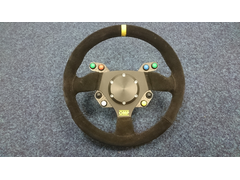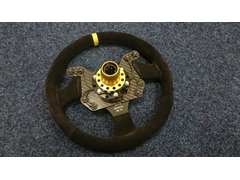
Want to build a wireless steering wheel controller system - advice?
woodsy144 - 21/2/23 at 08:01 AM
Hello all,
I am wanting to build a wireless steer wheel control system similar to a blinkstop.
Plan is to power the steer wheel side of things by using the horn power circuit.
I purchased a 6 channel 2.4ghz system online, to handle the comms. While it worked I found the latency too high especially for my flat shifter.
I was wondering if anyone has played around with build such things and have any advice.
obfripper - 21/2/23 at 11:33 AM
I would be looking at going wired, and using an airbag ribbon cable to carry the signal from the wheel, one from a modern car usually has 6-8
connection traces, and can be found cheaply online.
This would bring latency to a minimum, and allow you plenty of connectivity, as you could have the controller under the dash, and simple multiplexed
control at the switches/buttons just using different resistor values per button against a bias resistor at the microcontroller adc input, with some
deft resistor selection and programming it can also detect multiple presses over a single wire.
Look up ladder divider circuits for some schematics.
Even if you don't want to go wired, the electrical noise on slip ring contacts will likely play havoc with any microcontroller. You might get
away with using a slip ring to charge a small onboard battery (or large capacitor), and let the charge controller deal with noise as a fix.
In my experience, latency with those generic chinese wireless devices is poor and signal recognition is also dodgy, ie the mot ramp at work uses one
for the shaker plates control and you don't always get the function you selected, and then half second later it suddenly changes to the correct
function.
Dave
peter030371 - 21/2/23 at 12:43 PM
Yes I have some advice...don't do it 
I started down this path many years ago and many, like blinkstop/freehwell, have good looking systems for sale now but how reliable are they for
critical things like gear changing?
I know of two cars (both race) that have had problems with missed shifts and almost 100% certain they are down to the wireless system they used. Both
are well run cars and they didn't just go 'its that' they looked at telemetry etc and worked it out. One went back to wired and its
been fine since and one has an updated/improved commercial system but he has not raced much since getting it so no idea if its any better.
I own an electronic design and assembly company and we make a lot of low power RF systems (some automotive). I had a design sketched out some years
ago but RF just isn't that reliable so I ditched it and went for a wired system on my car. For non-critical stuff like lights I am sure RF is
fine....if it doesn't indicate the first time just press it again. For me wireless is when you simply cannot go wired and wired QR steering wheel
stuff is very much available. I don't have paddle shift but the less RF the better IMHO.
This what I ended up with and its 100% reliable 


Wheel2 front


Wheel2 Rear
gremlin1234 - 21/2/23 at 06:44 PM
as above, wired will be much more reliable,
the under bonnet environment is hostile to electronics at the best of times, and worse still to rf
rf generally works well enough for things like tyre pressure monitoring, but avoid it for real time stuff/ anything with any safety aspect
woodsy144 - 21/2/23 at 09:50 PM
Resistance Ladder - i looked into this, but the issue is the number of combinations and the complexity of the system. Say for example you have 4
buttons, from my very dirty calcs there are 20 different button combinations, so getting that number in a resistance ladder is difficult (well from
what I have found, open to suggestions.
Clock spring ribbon cable - I have looked into this but the issue is the length I can get and the wrap. For example, an wrap of an existing clock
spring is goes around the shaft, due to my space constraints I need it to go around the boss. This dramatically increases the length of wrap and space
required when it 'unwraps'. Still a possible solution, just gets messy.
Question - sorry for my ignorance, but what do you mean by wired QR steering wheel?
woodsy144 - 21/2/23 at 09:50 PM
Resistance Ladder - i looked into this, but the issue is the number of combinations and the complexity of the system. Say for example you have 4
buttons, from my very dirty calcs there are 20 different button combinations, so getting that number in a resistance ladder is difficult (well from
what I have found, open to suggestions.
Clock spring ribbon cable - I have looked into this but the issue is the length I can get and the wrap. For example, an wrap of an existing clock
spring is goes around the shaft, due to my space constraints I need it to go around the boss. This dramatically increases the length of wrap and space
required when it 'unwraps'. Still a possible solution, just gets messy.
Question - sorry for my ignorance, but what do you mean by wired QR steering wheel?
peter030371 - 22/2/23 at 08:01 AM
quote:
Originally posted by woodsy144
Question - sorry for my ignorance, but what do you mean by wired QR steering wheel?
Quick release steering wheel, I used this one with the electrical option and a curly wire behind the dash or a slip ring which you can get from ebay
JAG - 22/2/23 at 08:14 AM
I'm currently building a wired system onto a Quick Release Steering Wheel. Brightly coloured buttons on a Carbon Fibre plate (homemade) and wired
to the Dashboard via a Curly Cable and a Microphone Plug. I've bought all the parts from eBay etc...
My motivation was to simply make the car easier to drive - no need to take my hands off the steering wheel to operate commonly used stuff.
The steering wheel will have pushbuttons for Horn (Black Momentary Pushbutton), Headlight main beam (Blue on/off latching Pushbutton), Indicators
(on/off/on switch), Screen Wash (Yellow Momentary Pushbutton), Wipers (Green Momentary Pushbutton) plus a Red Pushbutton to handle the Speedo'
and Rev' Counter settings.
The switches, on the Steering Wheel, will operate a series of Relays behind the Dashboard by earthing the coils through the steering column. I've
got it assembled and tested - just gotta wire up the Dashboard harness to the Relays now.
[Edited on 22/2/23 by JAG]
woodsy144 - 22/2/23 at 11:31 AM
JAG, how are you running the cable? Just coiled?
Reason for me not going coiled is the engineers here won't approve something that has wires hanging down from the wheel.
Peter030371, can you please details of the slip rings you are referring to?
JAG - 22/2/23 at 12:19 PM
Yeah, just a coiled cable that will hang under the steering column and run to the female part of the microphone plug which will be under the Dashboard
- to avoid the rain etc...
My car passed SVA a while ago (2005), with switches mounted on the Dashboard, so nobody has to approve this design. I just found the car tricky to
drive like that and designed this solution a year or two back.
Where are you based?
[Edited on 22/2/23 by JAG]
woodsy144 - 23/2/23 at 05:49 AM
@JAG,
I am in Victoria Australia, so our rules are different and in some aspects, completely stupid. Way to OEM centric and conservative.
40inches - 23/2/23 at 09:45 AM
I used a MGTF slip ring for the Klicktronic.
One word of advice if you go down this route, you must use relays, even for the horn


Description


Description


Description
Striker Returns - 23/2/23 at 02:16 PM
I am going down the same worm hole. Currently still on the bench. I am planning on using the TY24D modules for the wireless and an arduino nano to
carry out logic. All non critical , indicators, full beam and horn. Software is done and running on an arduino uno at the moment
[Edited on 23/2/23 by Striker Returns]
Oddified - 25/2/23 at 09:17 PM
I built an rf system on the steering wheel to an rx under the dash (based on available 2.4g tx/rx modules). I only use it for line lock and launch
control and it works well for those tasks. I did some testing with a view to perhaps using it for shift controls etc in the future, repeatable latency
isn't good enough. If speed and reliability is important, use a wire 
Ian
Schrodinger - 28/2/23 at 11:55 AM
I doubt this will be cheap but you could try https://www.facebook.com/bodylogicuk/
peter030371 - 28/2/23 at 12:16 PM
The slip ring I used is very similar to what 40inches has posted, I just searched around ebay looking at loads of them until something that looked
about right came up. I asked the seller a few questions about size etc and then went for it. Fitting required a little fabrication with brakets
etc.
My previous Striker used a coiled cable from the wheel and connected at the dash with a XLR connector and then relays behind the dash. Sounds the same
as JAG has done. I had that Striker for 18 years before I sold it on and this worked perfectly for that. With a quick rack the cable works fine. I
remember I was switch limited by the number of cores on the coiled cable (and resistance ladders are not that great) but maybe 20+ years later there
is more choice on this.









